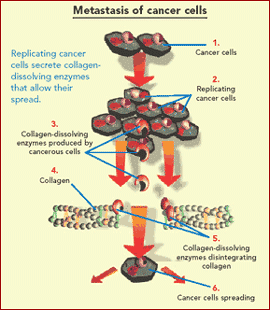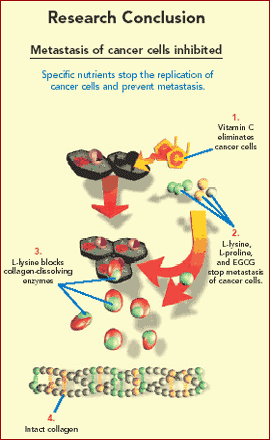- Have any questions? Contact us!
- info@dr-rath-foundation.org

Natural Eradication of AIDS
June 26, 2017
Natural Eradication of Cardiovascular Disease
June 26, 2017Natural Eradication of Cancer

All human cells are surrounded by collagen fibres and connective tissue. In order to grow and expand, healthy cells need to break down this extra-cellular barrier that confines them. This process is essential for life and for this reason, cells produce and secrete various enzymes that digest connective tissue components, including collagen and elastin.

It is important that these enzymes, called matrix metalloproteinases or MMPs, be regulated by sets of activators and inhibitors so that the integrity of the connective tissue is never compromised.
Excessive disintegration of connective tissue accompanies pathology and once this disintegration occurs, infectious cancer cell microbes (including viruses) can invade tissues. In extreme cases, such as in cancer, the excessive production of digestive enzymes and the disintegration of collagen and connective tissue by cancer cells are the dangerous mechanisms by which these cells invade and spread to other organs.
In their groundbreaking book ‘Victory Over Cancer‘, Dr. Rath and Dr. Niedzwiecki document their scientific discovery that certain nutrients, including the amino acid L-lysine, are powerful natural inhibitors of collagen-digesting enzymes. It is this discovery that has put the Dr. Rath Research Institute on the path to defeating cancer.
The Spread of Cancer Can Be Controlled

In the laboratory at the Dr. Rath Research Institute, scientists have conducted research with live cells to provide answers to various scientific questions. Once they understood the mechanism by which cancer cells metastasized, there was one critical question that they sought to answer: How could they naturally inhibit the invasion of cancer cells through collagen and connective tissue in a way that would enhance the body’s own capacity for managing this devastating disease?
In seeking this answer, the researchers designed an experiment so that they could first investigate the ability of cancer cells to digest through a collagenous matrix and then develop a method to control it. For this purpose, the researchers used specific vials that included partitions made of collagenous material similar to that which surrounds cells in the body. In the upper chamber of some vials, they incubated cancer cells with nutritive agents. In the upper chamber of other vials, they incubated cancer cells without nutritive agents. Afterwards, the researchers were able to determine which group of cancer cells was able to digest the collagen membrane and migrate to the lower chamber.
The results of the experiment were remarkable. A simple combination of nutrients was able to stop cancer cells from invading the collagen matrix!
The most powerful nutrient combination contained vitamin C, the amino acids L-lysine and L-proline, and a polyphenol fraction of green tea known as Epigallocatechin Gallate (EGCG).



